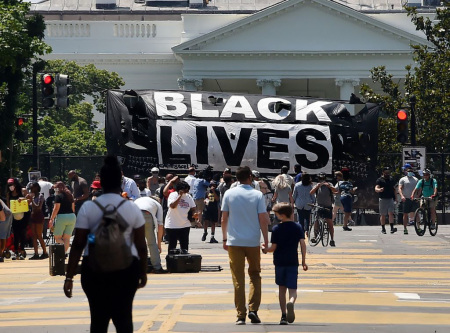'Woke' Gospel on race relations in light of George Floyd compromises biblical teaching: scholar

An Anglican scholar is warning that amid ongoing political developments related to racial injustice in the wake of the police killing of George Floyd, Christians are embracing a compromised Gospel as it relates to race.
In a Thursday essay at First Things, author and scholar Gerald McDermott of Beeson Divinity School in Birmingham, Alabama, wrote that in light of recent turmoil many parishioners and church leaders are "adopting a race narrative that is empirically and theologically suspect."
Whatever their denomination, many of these leaders are now opining that the United States is structurally or systemically racist and are shifting their ministry efforts to address racism, he said. Under the influence of what is known as Critical Race Theory, many white Christians are eager to display their virtue by confessing their “white privilege.” But this posture deserves greater theological scrutiny, he said.
"Paul said, 'From now on, we regard no one according to the flesh.' He saw other people as present or potential members of the 'new creation': 'The old has passed away and the new has come,'” McDermott observed, referencing 2 Corinthians 5:16–17.
"The new creation, wrote John, is made up of people 'from every nation (ethnous), tribe, people, and language'" he added, citing Revelation 7:9. "Nations (ta ethne) in the New Testament world were often multiracial, like the United States, but typically united by a common culture. The early church recognized that culture was rooted not in skin color but in religious cultus."
McDermott is editor of the forthcoming book Race and Covenant: Retrieving the Religious Roots for American Reconciliation.
When the Apostle Paul said in Galatians 3 that "in Christ there is neither Jew nor Greek" he was speaking about how Jesus brings unity based on religion, not race because Greeks and Jews come in many colors and that skin color is skin deep, McDermott noted. The only two "races," in the minds of the Apostles, were old creation and new creation.
"But the apostles went much further, teaching that the work of Jesus does not destroy the old creation unity of the one human race but redeems it and brings it to its God-given destiny by the power of the Spirit. Grace perfects nature through the preaching and sacraments of the Church: "If anyone is in Christ, he is a new creation," and our unity in creation is “transformed into the image [of Christ] from one degree of glory to another,” he said, again citing 2 Corinthians.
Yet in the 1970s, liberal Protestant denominations in the U.S. began trying to “diversify” clergy and congregations by employing quotas and teachings on systemic racism, he said, and many parishioners felt as though they were required to confess sins of previous generations as though they were culpable themselves. This theological shift has been a significant contributing factor in the decline of mainline Protestantism, he went on to say, and today evangelicals have been signaling similar signs.
"[T]he new anti-racism has become a new religion with its own original sin (white racism), baptismal liturgy (confession of whiteness), and new birth (to wokeness). But there is no redemption, and its ethic encourages people to practice what Jesus condemned, 'Do not judge, lest you too be judged' (John 7:1). It imputes motives to others based on skin color — bad motives to one skin color and good motives to other colors. This is racism by another name. It is also sinful judgment," he said.
The death of George Floyd sparked worldwide protests bolstered by a resurgent Black Lives Matter movement. The BLM organizational apparatus first appeared on the scene in 2013.
President of the Southern Baptist Convention J.D. Greear endorsed the black lives matter movement as a Gospel issue to members of the world's largest Baptist denomination Wednesday, but he denounced the BLM organization because of its stated political beliefs, which include the denuclearization of the family.
“I realize that the movement and the website have been hijacked by some political operatives whose worldview and policy prescriptions would be deeply at odds with my own, but that doesn’t mean that the sentiment behind it is untrue. I do not align myself with the Black Lives Matter organization,” Greear said.





















